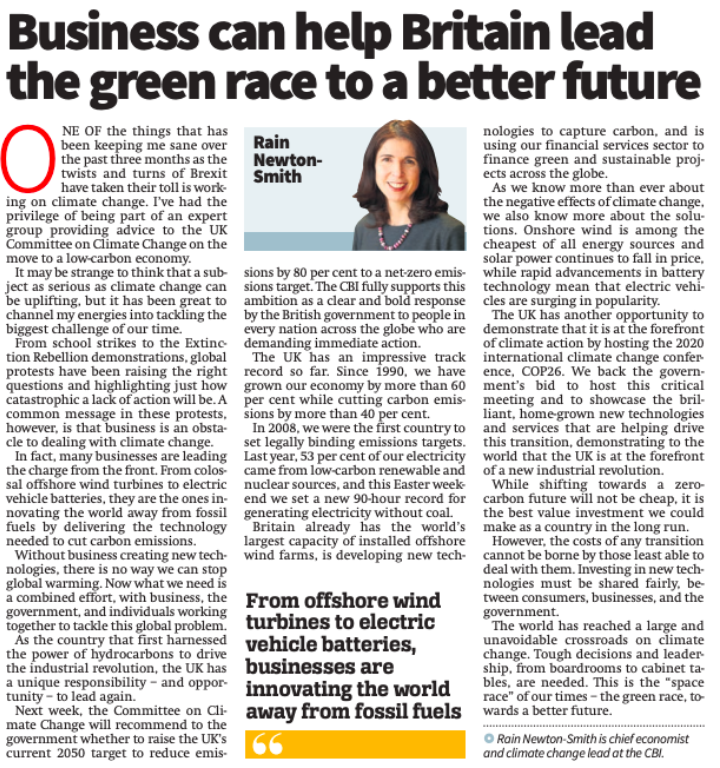Net zero: Five big questions
What to look out for in the Committee on Climate Change's net zero advice
By Richard Black
Share
Last updated:
On Thursday, the Committee on Climate Change publishes its new official advice on the UK's climate change target.
Commissioned by Government in October in the wake of the Intergovernmental Panel on Climate Change's (IPCC) latest landmark report, the Committee is expected to say that the UK should move to a net zero economy by 2050.

If Government accepts the advice - and it always has in the past - this will make the UK the first major economy in the world to set an emissions target in line with the 2015 Paris Agreement.
The Committee's advice will run to hundreds of pages of detail - but here are five of the key things to look out for. And in the meantime if you're looking for more detail on what 'net zero' means, why the IPCC says every country needs a net zero target and how it can be delivered, we've a series of 10 short Briefings on the hows and whys.
1. What year?
Most campaign groups such as Friends of the Earth say 2045, newcomers Extinction Rebellion say 2025. Which year will the CCC plump for?
The CCC has calculated a date for the UK to reach net zero emissions based primarily on two things: where science says the world needs to get to when, and how far the UK should be ahead of that goal. And ahead it most assuredly should be - firstly because like every other rich nation it pledged in the 1992 UN climate convention to be ahead, and also because it is currently the most successful of the major economies at reducing emissions.
But it will also want to be able to demonstrate that its chosen date is achievable and affordable.
The IPCC said that to give a 50% chance of keeping global warming to 1.5 degrees Celsius, which governments pledged to try to do in the Paris Agreement, global carbon dioxide emissions should hit net zero around 2050, with the target for all greenhouse gases met a couple of decades later. So a net zero date of, say, 2045 or 2050, applying to all greenhouse gases, is probably where the Committee will end up.
It's where the bulk of the other countries with net zero targets have landed - notably Sweden, the only nation currently with a target in law, of 2045.
2. Does 'zero' mean 'zero'?
There are several ways in which a net zero target can look more demanding that it actually is:
- does it cover all greenhouse gases, or just CO2?
- does it include emissions from international aviation and shipping (which, in principle, are regulated by international bodies)?
- does the country intend to do everything within its own borders, or to buy 'offsets' from other, presumably poorer, countries?
Sweden's net zero target, for example, excludes international aviation - a sector whose relative share of global emissions is set to increase - and allows for a small amount of international offsetting.
Will the UK's? It's not just about loopholes; doing everything within a nation's borders assures democratic control, and also gives businesses certainty that 'zero' really does mean 'zero', with no wiggle room.
3. What are the economic costs and benefits?
When the government set the UK's existing target - cutting emissions by 80% from 1990 levels by 2050 - the cost of that was estimated at 1-2% of GDP. Since then, the price of clean technologies such as wind and solar power and batteries has fallen faster than anyone predicted. So decarbonisation so far has probably come in cheaper than predicted.
What will the Committee project this time as the cost of meeting net zero?
And what will its sum include? Will it include the benefits of a net zero transition - of less ill health due to cleaner air, of less dependence on price-volatile oil and gas, of building UK clean tech companies with export markets? These economic benefits may be hard to capture, but they're real nevertheless.
4. How will we get there?
The Committee has already set out, repeatedly, many of the policies needed to reach the existing 80% target. There's little mystery... home insulation, electric cars, countryside policies that preserve peat and forest, and so on.
But what will it say about the extra 20%? Is that more of the same, or anything radically different? Will there be uncomfortable recommendations? For example, it's sometimes claimed that cutting emissions will mean banning meat-eating and flying... so, how draconian do things look in these two areas to the Committee's experts?
And what about negative emissions - sucking carbon dioxide out of the air? What scale - and how?
One thing we can definitely expect the Committee to say is that a net zero target means nothing without the policies to achieve it. This will mean action in all areas of the economy and thus most government departments.
5. What reaction?
It's no secret that the Committee has been preparing to recommend a net zero target. So anyone seriously opposed has had plenty of time to get their ducks in a row.

And yet... there has been hardly a peep. For business, the CBI is supportive, seeing big opportunities ahead for UK plc - provided government puts adequate policies in place. And other businesses in the UK, in Europe and globally, such as the giant shipping line Maersk, have pledged to phase out their own contribution to climate change by 2050.
The National Farmers' Union has gone further, declaring a desire to make UK agriculture "net zero across all greenhouse gas inventories by 2040 or before" - again, contingent on adequate policymaking.
Of the 100+ responses the CCC received to its Call for Evidence on the net zero target, not a single business group opposed the concept. Many ask for a level international playing field or use of offsets - but on the rationale, there's nothing.
Nearly 200 MPs from all parties, co-ordinated by Conservative Simon Clarke, have signed a letter to the Prime Minister asking for a net zero target 'before 2050'.
The British public seems to agree, with two-thirds supporting the idea of ending Britain's greenhouse gas output within a few decades.
It's a remarkable consensus, and one that ministers will surely bear in mind as they decide their response to the Committee's advice.
Share